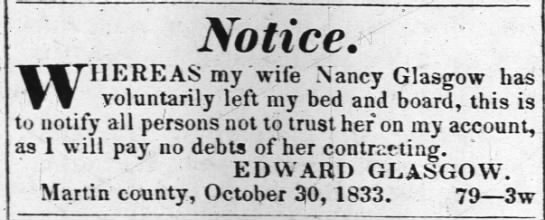Beginning on June 27th, 1819, Gen. Slade traveled from Martin County, NC to Nashville, TN. His daily diary of the trip seems to present a curmudgeon who found fault with many things along the way. We will not go all the way with him, but will follow him until he reaches the University in Chapel Hill.
27th.
Dined at John Griffin's, stopped at Wilson Sherrod's, fed
and rested my horse, bill 25cs., and arrived at Tarboro [Edgecombe County] that evening.
28th.
After arranging some private business and visiting my
friends with whom I had some agreeable conversation on the subject of my
journey, set out about 10 o'clock, bill Mrs. Gregory $1.50, McWilliam $1.20. By 121/2 arrived at Mr. W. Parker's to dinner, spent about 2 hours in very
agreeable conversation with him and his amiable lady; bill 50cs. Set out at 3
o'clock, stopped at Daniels a few minutes to have my horse watered and get some grog, went on, met very unexpectedly an old acquaintance, Mr, James Blount, from Georgia. After usual ceremonies went on and arrived at sundown at the well
known stand in Nash County, Mr. J. T's, where I put up the night. Went to bed
supperless. Saw there all the features of uncivilized life and that Mr. T 's daughters though unmarried all had separate names,
as Polly H , Ann B &c.
29th.
Set off from T 's before sunrise. Bill 50cs. Memo. a
lame man with a blind horse staid last night at T's who had been eight days traveling from Raleigh there, only
thirty-five miles. Arrived at Major Alford's to Breakfast, where I met with every attention, and treated very
hospitably. Bill 50cs. Arrived at Raleigh [Wake County] at 12 o'clock, at Col. Cooke's. After dinner having dressed
strolled out to stroll up and down the principal streets without appearing to notice one of the puffed little great men
of the city, being resolved to observe as little ceremony towards them as they are usually in the habit of
showing to all strangers, and after visiting my cousins at Mrs. Pullum's, conversing with them for a while, I
returned to my lodgings. In course of the day had occasion to call on the deputy clerk of the Federal court on business,
was ushered into his office with all the hauteur of a French exciseman, and treated with every mark of
supercilious pride and haughty arrogance and finally dismissed with contempt. After supper I retired to my room where I was visited by J. B. Slade,
my relation, who staid with me all night & we pass the time
much more agreeable than I had done during the day.
30th.
Left Raleigh at Sunrise, Bill $2.00 with a perfect confirmation
of former opinion "that the citizens are a perfeet set of blood suckers
who prey upon the vitals of the State and wallow in luxuriant indolence."
Arrive at Jones' to brkft, ; bill (60cs. Arrived at Chapell that evening
in a severe shower of Rain ( which tho' not so agreeable to my situation was most acceptable to visitors to that
part of the country, as it was and had been for some time so dry as to endanger the crops of corn in all the
upper country. Wheat crops uncommonly good, price 25cs per bus. & and little or no demand for it at that or
even any price). At Mrs. Mitchell's Hotel was met and greeted as soon as arrived by cousin Jeremiah and Thomas B.
Slade, dined, after the shower was over went with Cousin Thomas to Mr. Mooring's Hotel, was introduced to
several collegiates of respectability & to Mr. Mark Henderson, attorney at law, whom I found particularly
agreeable, polite and attentive, & as we returned to Mr. Mitchell's invited us to his father's, Pleasant Henderson's Esqr. to sup & spend the evening, which we accepted, (Cousin Thomas from an inclination to be
with the young ladies of the family & I for the gratification of an acquaintance of so respectable a
family). On entering the house I was introduced by Cousin Thomas to a Miss Kittrell & to Miss Eliza
Henderson, only daughter of Mr. P. H., who, take her all in all (tho' not a Venus di Medici in form & feature) is
as pretty, agreeable, and desirable as is rarely to be met with. She was easy in her manners, gracefull in her actions
& movements, condescending and affable in conversation, still modest and unassuming. We spent the evening
till late bed-time in very agreeable conversation, when we retired to Mrs. Mitchell's & rested for the
night. |
| [As that appeared in The Raleigh Minerva (Raleigh, NC) 2 Jul 1819. This was about the time that Jeremiah Slade passed through.] |
Thursday, July 1st.
After breakft. visited college which appeared almost deserted, except now and then a solitary Bachelor silently gliding across the long passages. The Dialectic Hall appeared much improved since my last visit, the library has received a large acquisition of books to the amt. of five hundred dollars within the last year. Met there Mr. Thomas Green, ov Va., late of the senr. class. He appeared very much reserved, and tho' we had been formerly acquainted he seemed not disposed to renew it. Returned to Mrs. Mitchell's to dinner and shortly after set out for Hillsboro, accompanied by Cousin Thos. Bill with Mrs. Mitchell $2.00. We arrived at Thompson's Inn in Hillsboro at sunset, disappointed in our expectations of meeting Mrs. Doctr. Pugh & others on their way to Louisiana, nor did they arrive during my stay in Hillsboro.
2nd.
Lef Hillsboro after Breakft, Bill $1.80. Crossed Troliner's Bridge about 12 o'clock: had a smart words with Mrs. Troliner about the toll, paid 20 cs and parted in friendship.
["Slade Genealogy" at http://www.sladegenealogy.net/g0/p353.htm ;















